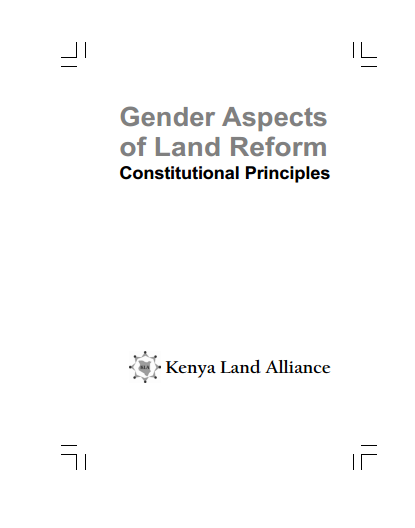Promoção dos Direitos Relativos à Terra em África: Que diferença fazem as ONGs?
O estudo demonstra claramente as deficiências dos modelos lineares que separam os processos de elaboração de políticas da sua implementação. Ambos os estudos de caso mostram que a legislação e os regulamentos podem ser modificados, reinterpretados ou simplesmente ignorados quando se trata de implementá-los, quando as relações de poder a nível local se tornam críticas. Esta constatação tem duas implicações directas.
Rights and reality are women's equal rights to land, housing and property implemented in East Africa ?
Rights and reality are women's equal rights to land, housing and property implemented in East Africa ?
Mortgaging the Future: The World Bank’s Land Agenda in Africa
Analyses the World Bank’s Policy Research Report (PRR) from a gender perspective and is critical of the consultation process on it thus far. It has important implications for women in Africa. The Bank believes land should be viewed not as a source of subsistence but of capital. It ignores women’s unpaid labour as a factor in agricultural productivity. It treats the household as an undifferentiated unit and ignores that the family often functions as a site of oppression. The Bank stresses ‘motivated’ family labour but ignores that much of women’s labour is far from voluntary.
Gendered Land Rights – Process, Struggle, or Lost C(l)ause?
Highly condensed paper on gendered land rights, written principally for Oxfam staff and partners, and summarising some of the literature on Africa and elsewhere.
Gender Aspects of Land Reform Constitutional Principles
Throughout this pocket size booklet, Land Reform Volume 4, KLA proposes that collectively as a nation, and especially during this time of the constitutional review process. The principles outlined be embraced with the purpose of providing women a deliberate opportunity to engage in decision-making as regards land-use,management and ownership.
The Emergence Of The Landless People’s Movement In SA
The new political dispensation in South Africa was the result of a political compromise, which depended on a crucial agreement to leave many of the existing power and wealth relationships intact. The advent of democracy in South Africa presented African people with long awaited political freedom but minimal social and economic liberation. The wealth was to remain in the hands of the few and any attempts by government to reverse the status quo was thwarted by the realities of the harsh global capitalist market system.
CEDAW Combined Fourth and Fifth Periodic Reports of States Parties: Ethiopia
Ethiopia has combined its fourth and fifth reports to the United Nations Committee that monitors the implementation of the Convention on the Elimination of All Forms of Discrimination Against Women (CEDAW). This report outlines the status of women in Ethiopia and initiatives on the part of all government and non-governmental actors to address the goals set out by CEDAW. Institutional commitments to address gender issues are in place. However, the socioeconomic status of women, particularly in rural areas, remains lower in Ethiopia's male-biased social structures.
Women's Informal Employment in Transition Economies
Women's employment in transition countries, notably Central and Eastern Europe has become increasingly informal and flexible. The first growing trend is that women are more involved in cross-border trade, known as 'suitcase' trade, often keeping women away from home for days or months. They buy mainly consumer and household goods usually unavailable in their home countries, to sell to street vendors on their return home. The second growing trend is women's involvement in sub-contracting, particularly work such as hand sewing for the textile and shoe industries.
How Can Land Tenure Reform Contribute to Poverty Reduction?
Paper written in response to 5 questions asked by the Forum organisers. Under what circumstances can land tenure reform contribute to rural poverty reduction and sustainable natural resources management? How can land tenure reform be carried out in a manner that is pro-poor? What types of actions should donors support in order to promote pro-poor land tenure reform? What actions should be taken to address the particular problems faced by women, indigenous groups and pastoralists in gaining secure access to land?
Rights and Reality, Are Women's Equal Rights to Land, Housing and Property Implemented in East Africa?
Are women's equal rights to land, housing and property implemented in East Africa? How are land rights translated into national legislation in the Region? This books explores land, housing and property rights in Uganda, Tanzania and Kenya, and looks at how relevant international treaties are transformed into national legislation and policies in these three countries. A detailed analysis of constitutions and laws on land, housing, inheritance, marriage and divorce laws is also offered.







